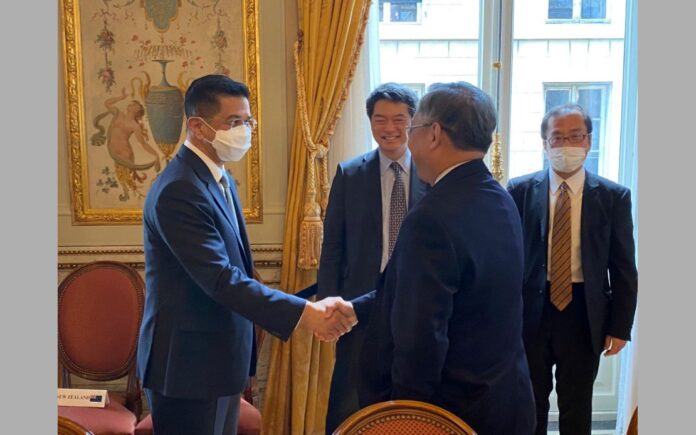KUALA LUMPUR, June 11 — The Indo-Pacific Economic Framework (IPEF) should be used as a platform to embark on a new paradigm of the 21st Century to ensure faster and fairer growth for economies in the region, as well as foster inclusivity and shared prosperity.
Senior Minister of International Trade and Industry Datuk Seri Mohamed Azmin Ali said as the world moves toward greater convergence of issues across the board, the Framework’s strategic and economic significance lies in its ability to strengthen the region’s trade ecosystem, providing the impetus to drive economic engagement and cooperation.
He said this on his Twitter account today after attending the informal Ministerial meeting of the IPEF for Prosperity, with 13 other Framework partners this afternoon in Paris.
“In my intervention, I reiterated Malaysia’s position that the Framework is indeed a vital tool of economic diplomacy in forging further linkages between the United States (US) and the Indo-Pacific region.
“With the focus of today’s proceedings on the Trade Pillar, I urged for collaborative resolution of trade issues through consultation and dialogue as such an approach would resonate with the region at large,” he said.
Additionally, Mohamed Azmin said technical assistance and capacity building must be an integral part of IPEF, otherwise, the mantra of inclusivity for all Framework partners will ring hollow and plurilateral economic cooperation for regional prosperity will be illusory.
“I also drove home the imperative for ground rules to ensure more efficient deliberations via a more dynamic and comprehensive negotiation process,” he said.
In this vein, the minister proposed that flexibility, for example special and differential treatment, should be accorded to ensure that the application of rules and provisions produces fair and equitable outcomes.
This, he added, is crucial considering the differences in socio-economic development status among the partners.
During the meeting, Mohamed Azmin also shared on Malaysia’s progress and advances made in the ratification of conventions on labour practices, including the International Labour Organisation (ILO) Protocol 29, and that the country had also passed multiple legislation to protect the rights of foreign workers.
This included the prevention of forced labour, payment of wages via bank accounts and protection to all workers, not to mention the proactive action to ensure compliance with international labour laws and regulations.
“As for supply chain resilience that is so vital to facilitate seamless flow of trade at the regional level, I stressed that the recently signed the memorandum of cooperation on Semiconductor Supply Chain Resilience between Malaysia and the US is indeed a strategic move to deal with contingencies and uncertainties.
“I projected that our national Digital Economy Blueprint will drive Malaysia’s transformation agenda for the nation to become a vibrant digital economy, and that we are well-poised to fully participate in IPEF’s digitalisation initiatives,” he said.
On the subject of corruption, Mohamed Azmin highlighted that this remains one of the main global issues which require coordinated solutions and international cooperation.
“In this regard, I stressed that Malaysia, which places great importance on good governance, transparency, accountability, effectiveness, and efficiency, has been a party to the United Nations Convention Against Corruption since its inception.”
Significantly, he said Malaysia has identified 115 initiatives under the National Anti-Corruption Plan 2019-2023, which was developed to transform Malaysia into a corruption-free nation.
“I pointed out that through the Framework’s Tax and Anti-Corruption Pillar, Malaysia’s existing anti-corruption structure could be further enhanced with the caveat that the tax element should be separated from the Anti-Corruption component, so as to allow for more nuanced and impactful deliberations,” he added.
















